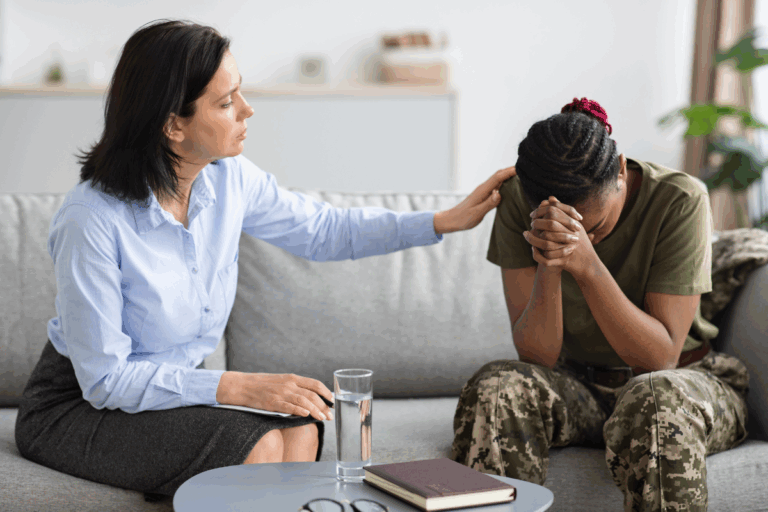
Post-Traumatic Stress Disorder (PTSD) affects not only a person’s emotional well-being but also their relationships. Whether with a spouse, partner, friend, or family member, PTSD can create emotional and psychological barriers that strain even the strongest connections.
Symptoms of PTSD
PTSD develops after experiencing or witnessing a traumatic event. Common symptoms include:
- Intrusive Thoughts: Recurring memories, flashbacks, or nightmares related to the traumatic event. According to the National Institute of Mental Health, intrusive thoughts are one of the core symptoms of PTSD.
- Avoidance: People with PTSD often avoid situations, people, or places that remind them of the trauma, as explained by the American Psychiatric Association.
- Mood Swings: Persistent negative emotions like fear, guilt, or anger, which can lead to detachment from loved ones. These mood changes are common in PTSD, as detailed by the Mayo Clinic.
- Hyperarousal: Being easily startled, having trouble sleeping, or feeling constantly on edge. The National Center for PTSD provides extensive resources on managing hyperarousal.

These symptoms not only affect the individual but can also create ripple effects in their relationships.
How PTSD Affects Relationships
People with PTSD may find it difficult to connect emotionally with others. Common ways it affects relationships include:
- Emotional Withdrawal: Individuals may feel numb or detached, making it difficult to engage in meaningful conversations or offer emotional support.
- Communication Issues: Feelings of shame, fear, or frustration can hinder open communication. Partners may struggle to express their needs, and loved ones may not know how to help.
- Trust Issues: Trauma can make trusting others difficult. Those with PTSD may fear being misunderstood, which can lead them to push others away.
- Conflict: Heightened irritability or emotional outbursts can escalate small disagreements into larger conflicts.
- Physical Intimacy: PTSD can affect physical relationships, as individuals may avoid intimacy due to associating closeness with vulnerability or danger. The National Alliance on Mental Illness (NAMI) offers additional insights into how PTSD affects personal relationships.
Managing a Relationship with PTSD
Supporting a loved one with PTSD can be challenging but is possible with the right strategies and mindset.

1. Open Communication: Create a space for open and honest conversations. Ask your partner about their triggers and how you can support them. Be empathetic and patient. If discussing trauma is difficult, seek professional help to facilitate conversations. Organizations like Psychology Today can help locate trauma therapists in your area.
2. Educate Yourself: Understanding PTSD will help you support your loved one better. Resources like the National Center for PTSD provide valuable information for family and friends, helping you better cope with the challenges that arise.
3. Encourage Therapy: Therapy, especially trauma-focused treatments like Cognitive Behavioral Therapy (CBT) and Eye Movement Desensitization and Reprocessing (EMDR), can be effective in helping individuals manage PTSD. Professional support can aid in processing trauma and improving emotional health.
4. Set Boundaries: Boundaries are crucial for both individuals in a relationship. While supporting your loved one, ensure you take care of your own needs to prevent burnout. Establishing healthy boundaries around communication and time can lead to a more balanced relationship. For tips on setting boundaries, visit HelpGuide.
5. Be Patient: Healing from trauma takes time, and it’s essential not to ush the process. PTSD is a chronic condition, and while progress can be made, it may take longer than expected. Patience is key in helping your loved one heal.
Final Thoughts
PTSD doesn’t just affect the individual—it impacts relationships in significant ways. With the right support, education, and strategies, both partners can work together to overcome these challenges. Healing from PTSD is a journey that takes time, but with patience and care, stronger, more resilient relationships are possible.
Responsibly edited by AI
Other Blog Posts in
Animo Sano Psychiatry is open for patients in North Carolina, Georgia and Tennessee. If you’d like to schedule an appointment, please contact us.
Get Access to Behavioral Health Care
Let’s take your first step towards. Press the button to get started. We’ll be back to you as soon as possible.ecovery, together.




